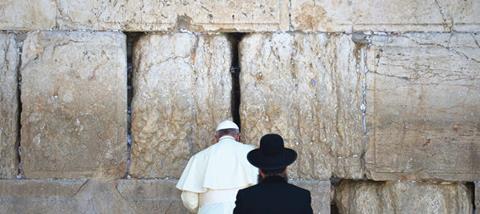
At the end of last year, the Catholic Church and a group of Orthodox Jews released statements that called for renewed cooperation and theological engagement between Jews and Christians. The Pontifical Commission for Religious Relations with the Jews (CRRJ) and The Center for Jewish-Christian Understanding and Cooperation’s (CJCUC) statements were separate, but both explored the relationship between Jews and Christians, and reflected on the divine purposes behind God’s covenant(s) with them.
The Roman Catholic statement, in a somewhat inconsistent way, disavowed ‘institutional mission’ to Jews, while also recognising the responsibility of all Christians to witness to their faith, and affirming the traditional Catholic position on the uniqueness of Christ as saviour. The Orthodox Jewish statement affirmed the Jewishness of Jesus and his teaching, stating that ‘Jesus brought a double goodness to the world. On the one hand he strengthened the Torah of Moses majestically…and not one of our Sages spoke out more emphatically concerning the immutability of the Torah.’
The Catholic statement, a 10,000- word, carefully phrased ‘reflection’, does not have any official status as Roman Catholic doctrine. It contains paradoxical statements, especially on whether Jewish people can be saved through keeping the Torah (Jewish law) when Jesus Christ is the only way to salvation.
Nevertheless, it builds on the achievements of the past 50 years. These achievements include a change in relations between Catholics and Jews from a ‘detached co-existence to deep friendship’; the revision of ‘imprecatory’ Good Friday prayers holding the Jews to account for the death of Jesus; and the steady improvement in relationships culminating in Pope John Paul’s welcome in the synagogue in Rome and during his visit to Israel, where he addressed the Jewish people as ‘elder brothers’ in faith.
The Orthodox Jewish statement has a positive tone, encouraging less fear and greater trust and engagement between Christians and Jews, but does not speak for the majority of Orthodox (let alone Conservative, Reform and Liberal) Jews. It was roundly criticised in Jewish circles for misrepresenting traditional Jewish teaching on other religions, and for going too far in its positive regard for Jesus and its inclusion of Christianity within God’s covenantal design.
MESSIANIC JEWS
The major omission from both statements is the recognition of Messianic Jews (Jews who believe in Jesus). There is no discussion of the ongoing presence, theological significance and contribution of Messianic Jews in either statement.
This omission perpetuates the supposed separation between Jews and Christians. But in reality, Messianic Jews are the missing link between Judaism and Christianity. During the first century, Judaeo-Christians were in a majority, but in the centuries that followed they supposedly dwindled to the point of ‘extinction’. One of the benefits of the recent growth of this movement is how it calls on Jews and Christians to recognise God’s divine purposes for both Israel and the nations.
Messianic Jews cannot be ignored in such discussions, but the call to recognise their existence and enter into dialogue with them is something of an embarrassment to Christians involved in Jewish-Christian dialogue, as their existence suggests an ongoing mission to Jews and threatens the goodwill and mutual respect Christian leaders work hard to cultivate with the Jewish community. Likewise, their presence gives offence to Jewish community leaders who see them as apostates, and even their claims to be Jewish as spurious and deceptive. This is not surprising in light of the tortuous history of Jewish-Christian relations over the past 2,000 years.
WORKING WITH PALESTINIAN CHRISTIANS
I recently met with fellow Messianic Jews and Palestinian Christians to issue the Larnaca Declaration, hosted by the Lausanne Initiative for Reconciliation in Israel- Palestine (LIRIP). It was a time for discussion, prayer and reflection on the theological and political issues that divide Messianic Jews and Palestinian Christians. Such meetings are vital if mutual understanding and reconciliation are to take place, both among believers and in wider society. The statement calls for reconciliation in the spirit of brotherly love, and in the light of the gospel we share with both Israeli and Palestinian. While our narratives, identities and theologies are often in conflict, we are committed to one another and to building peace together for the sake of the gospel and our unity in the body of Christ.
Peace-building initiatives need our prayers and support. It is not an easy task. We take inspiration from the life and work of Sir Nicholas Winton (1909–2015), now commemorated by the Post Office stamp, who organised the rescue of 669 children, most of them Jewish, from Czechoslovakia on the eve of the Second World War in an operation later known as the Czech Kindertransport (German for ‘children transportation’). Winton found homes for the children and arranged for their safe passage to Britain. As he said: ‘If something is not impossible, then there must be a way to do it.’
The same could be said of Jewish- Christian relations. For much of the past 2,000 years, under the shadow of anti-Jewish legislation in the
Messianic Jews Cannot Be Ignored
Councils of Nicaea and Chalcedon, the Crusades, the Inquisition, and the silence of the churches during the Holocaust, Jewish-Christian relations still have a long way to go before mutual understanding and true reconciliation are achieved. But as Rabbi Tarfon taught: ‘It is not your responsibility to finish the work of perfecting the world, but you are not free to desist from it either.’ Messianic Jews, experiencing the challenge from both sides, are uniquely placed to help bridge the gap that still separates the two larger communities of faith.
DR RICHARD HARVEY is senior researcher with Jews for Jesus and former academic dean at All Nations Christian College. He blogs at mappingmessianicjewishtheology.eu



























